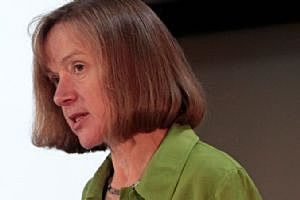WRAP chief calls for UK to aim for food waste-free future
The UK needs to take bolder steps in tackling food waste to help future generations avoid resource scarcity challenges, according to WRAP chief executive Liz Goodwin.
Goodwin warned delegates at a Westminster Forum conference on food waste in London today (17 July) that food was a “scarce critical resource” that the UK was currently “squandering”.
The average UK household throws away the equivalent of six meals every week which is costing the nation almost £60 a month, according WRAP.
Goodwin said that the younger generation could face a variety of resource challenges in the future if action was not taken on preventing food waste now.
She explained: “This is a generation which, when they’re in their early fifties in 2050, will face a 60% global increase in demand for food.
“The global trends of consumption are indeed chilling. A global population of over nine billion by 2050. A world where almost three billion people – more than 40% of today’s global population – will join the middle classes. As a consequence, the generation that by 2050 could face major risks to food prices, security of supply, and potential associated social unrest.”
Goodwin also said that a shortage of scarce resources linked to food production such as water and labour could cause problems in the future.
She mentioned that her nephew named Jack had just turned eighteen. She warned that her nephew had “a lot to contend with when he is his fifties” and warned that everyone in the UK had a duty to the younger generation to take “steps now to prevent the 2050 I described”.
She said that the next five years would be critical to tackling the causes of food waste and that there could be a “positive side to 2050”.
Goodwin asked delegates to imagine a UK in 2050 where everyone has an integrated food waste bin “built-in to our kitchens as standard”. She also said by 2050, no food will be sent to landfill.
She explained that “long before 2050 all UK residents should have access to separate food waste collections”.
Elsewhere, she highlighted WRAP’s work on the voluntary food waste-prevention agreement – the Courtauld Commitment. She said it had been successful and brought together governments, retailers and brands to tackle household food waste in a way not seen before.
Goodwin said that WRAP was currently developing proposals for the “next Courtauld type collective action”. She said it will help to equip the UK economy and society to meet global challenges on food sustainability.
The next phase of this plan will look at several themes, including sustainable design, value chain optimisation, consumption behaviours and maximising the value from unconsumed food, Goodwin said.
She added: “Part of WRAP’s role will be to marshal activity, identify and share good practice, and measure outcomes around these themes. Critically, we are seeking to broker collaboration that delivers change at the system level.”


































